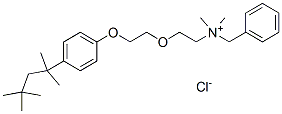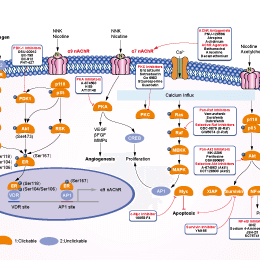
- Bioactive Compounds
- By Signaling Pathways
- PI3K/Akt/mTOR
- Epigenetics
- Methylation
- Immunology & Inflammation
- Protein Tyrosine Kinase
- Angiogenesis
- Apoptosis
- Autophagy
- ER stress & UPR
- JAK/STAT
- MAPK
- Cytoskeletal Signaling
- Cell Cycle
- TGF-beta/Smad
- DNA Damage/DNA Repair
- Compound Libraries
- Popular Compound Libraries
- Customize Library
- Clinical and FDA-approved Related
- Bioactive Compound Libraries
- Inhibitor Related
- Natural Product Related
- Metabolism Related
- Cell Death Related
- By Signaling Pathway
- By Disease
- Anti-infection and Antiviral Related
- Neuronal and Immunology Related
- Fragment and Covalent Related
- FDA-approved Drug Library
- FDA-approved & Passed Phase I Drug Library
- Preclinical/Clinical Compound Library
- Bioactive Compound Library-I
- Bioactive Compound Library-Ⅱ
- Kinase Inhibitor Library
- Express-Pick Library
- Natural Product Library
- Human Endogenous Metabolite Compound Library
- Alkaloid Compound LibraryNew
- Angiogenesis Related compound Library
- Anti-Aging Compound Library
- Anti-alzheimer Disease Compound Library
- Antibiotics compound Library
- Anti-cancer Compound Library
- Anti-cancer Compound Library-Ⅱ
- Anti-cancer Metabolism Compound Library
- Anti-Cardiovascular Disease Compound Library
- Anti-diabetic Compound Library
- Anti-infection Compound Library
- Antioxidant Compound Library
- Anti-parasitic Compound Library
- Antiviral Compound Library
- Apoptosis Compound Library
- Autophagy Compound Library
- Calcium Channel Blocker LibraryNew
- Cambridge Cancer Compound Library
- Carbohydrate Metabolism Compound LibraryNew
- Cell Cycle compound library
- CNS-Penetrant Compound Library
- Covalent Inhibitor Library
- Cytokine Inhibitor LibraryNew
- Cytoskeletal Signaling Pathway Compound Library
- DNA Damage/DNA Repair compound Library
- Drug-like Compound Library
- Endoplasmic Reticulum Stress Compound Library
- Epigenetics Compound Library
- Exosome Secretion Related Compound LibraryNew
- FDA-approved Anticancer Drug LibraryNew
- Ferroptosis Compound Library
- Flavonoid Compound Library
- Fragment Library
- Glutamine Metabolism Compound Library
- Glycolysis Compound Library
- GPCR Compound Library
- Gut Microbial Metabolite Library
- HIF-1 Signaling Pathway Compound Library
- Highly Selective Inhibitor Library
- Histone modification compound library
- HTS Library for Drug Discovery
- Human Hormone Related Compound LibraryNew
- Human Transcription Factor Compound LibraryNew
- Immunology/Inflammation Compound Library
- Inhibitor Library
- Ion Channel Ligand Library
- JAK/STAT compound library
- Lipid Metabolism Compound LibraryNew
- Macrocyclic Compound Library
- MAPK Inhibitor Library
- Medicine Food Homology Compound Library
- Metabolism Compound Library
- Methylation Compound Library
- Mouse Metabolite Compound LibraryNew
- Natural Organic Compound Library
- Neuronal Signaling Compound Library
- NF-κB Signaling Compound Library
- Nucleoside Analogue Library
- Obesity Compound Library
- Oxidative Stress Compound LibraryNew
- Plant Extract Library
- Phenotypic Screening Library
- PI3K/Akt Inhibitor Library
- Protease Inhibitor Library
- Protein-protein Interaction Inhibitor Library
- Pyroptosis Compound Library
- Small Molecule Immuno-Oncology Compound Library
- Mitochondria-Targeted Compound LibraryNew
- Stem Cell Differentiation Compound LibraryNew
- Stem Cell Signaling Compound Library
- Natural Phenol Compound LibraryNew
- Natural Terpenoid Compound LibraryNew
- TGF-beta/Smad compound library
- Traditional Chinese Medicine Library
- Tyrosine Kinase Inhibitor Library
- Ubiquitination Compound Library
-
Cherry Picking
You can personalize your library with chemicals from within Selleck's inventory. Build the right library for your research endeavors by choosing from compounds in all of our available libraries.
Please contact us at [email protected] to customize your library.
You could select:
- Antibodies
- Bioreagents
- qPCR
- 2x SYBR Green qPCR Master Mix
- 2x SYBR Green qPCR Master Mix(Low ROX)
- 2x SYBR Green qPCR Master Mix(High ROX)
- Protein Assay
- Protein A/G Magnetic Beads for IP
- Anti-Flag magnetic beads
- Anti-Flag Affinity Gel
- Anti-Myc magnetic beads
- Anti-HA magnetic beads
- Magnetic Separator
- Poly DYKDDDDK Tag Peptide lyophilized powder
- Protease Inhibitor Cocktail
- Protease Inhibitor Cocktail (EDTA-Free, 100X in DMSO)
- Phosphatase Inhibitor Cocktail (2 Tubes, 100X)
- Cell Biology
- Cell Counting Kit-8 (CCK-8)
- Animal Experiment
- Mouse Direct PCR Kit (For Genotyping)
- New Products
- Contact Us
Benzethonium Chloride
Benzethonium chloride is a potent inhibitor of nAChRs, it inhibits α4β2 nAChRs and α7 nAChRs with IC50 of 49 nM and 122 nM, respectively.

Benzethonium Chloride Chemical Structure
CAS No. 121-54-0
Purity & Quality Control
Benzethonium Chloride Related Products
| Related Targets | mAChR nAChR AChE | Click to Expand |
|---|---|---|
| Related Products | PNU-120596 Arecoline HBr Otilonium Bromide Lycorine Hyoscyamine (-)-Huperzine A (HupA) Nitenpyram Cytisine Chelidonine | Click to Expand |
| Related Compound Libraries | FDA-approved Drug Library Natural Product Library Neuronal Signaling Compound Library CNS-Penetrant Compound Library Anti-alzheimer Disease Compound Library | Click to Expand |
Signaling Pathway
Biological Activity
| Description | Benzethonium chloride is a potent inhibitor of nAChRs, it inhibits α4β2 nAChRs and α7 nAChRs with IC50 of 49 nM and 122 nM, respectively. | ||||
|---|---|---|---|---|---|
| Targets |
|
| In vitro | ||||
| In vitro | Benzethonium chloride inhibits the α7 nAChRs in a mixed competitive and non-competitive manner but there is no voltage- or use-dependence of the response in either subtype. [1] Benzethonium chloride inhibits muscarinic signaling with a calculated IC50 of 15 μM and a Hill coefficient of 0.6. [3] Benzethonium (5 μM) significantly increases cytosolic Ca(2+)-concentration, decreases forward scatter and triggered annexin V-binding affecting some 30% of the erythrocytes. Benzethonium (5 μM) further significantly enhances the effect of glucose depletion on cytosolic Ca(2+)-concentration and annexin V-binding, but significantly blunts the effect of glucose depletion on forward scatter. Benzethonium (5 μM) significantly enhances lactic acid formation but not ceramide abundance. [4] Benzethonium chloride reduces cell viability with IC50 of 3.8 μM in FaDu, 42.2 μM in NIH 3T3, 5.3 μM in C666-1, and 17.0 μM in GM05757. Benzethonium chloride (9 μM) induces apoptosis and activates caspases after 12 hours in FaDu cells. [5] |
|||
|---|---|---|---|---|
| Cell Research | Cell lines | FaDu, C666-1, NIH 3T3 and GM05757 cell lines | ||
| Concentrations | 42.2 μM | |||
| Incubation Time | 48 hours | |||
| Method | Cells are seeded in 96-well plates at 5,000 per well in 100 μL of growth medium and allowed to incubate for 24 hours. Benzethonium chloride is then added, as indicated, in a total volume of 5 μL. After 48 hours, MTS assay is done according to the specifications of the manufacturer, with DMSO (0.1%)–treated cells as negative control. |
|||
| In Vivo | ||
| In vivo | Benzethonium chloride (5 mg/kg) ablates the tumor-forming ability of FaDu cells, delays the growth of xenograft tumors, and combined additively with local tumor radiation therapy in established FaDu tumors in SCID mice. [5] |
|
|---|---|---|
| Animal Research | Animal Models | established FaDu tumors in SCID mice. |
| Dosages | 5 mg/kg | |
| Administration | intraperitoneal injection | |
Chemical Information & Solubility
| Molecular Weight | 448.08 | Formula | C27H42NO2.Cl |
| CAS No. | 121-54-0 | SDF | Download Benzethonium Chloride SDF |
| Smiles | CC(C)(C)CC(C)(C)C1=CC=C(C=C1)OCCOCC[N+](C)(C)CC2=CC=CC=C2.[Cl-] | ||
| Storage (From the date of receipt) | |||
|
In vitro |
DMSO : 90 mg/mL ( (200.85 mM) Moisture-absorbing DMSO reduces solubility. Please use fresh DMSO.) Water : 90 mg/mL Ethanol : 90 mg/mL |
Molecular Weight Calculator |
|
In vivo Add solvents to the product individually and in order. |
In vivo Formulation Calculator |
||||
Preparing Stock Solutions
Molarity Calculator
In vivo Formulation Calculator (Clear solution)
Step 1: Enter information below (Recommended: An additional animal making an allowance for loss during the experiment)
mg/kg
g
μL
Step 2: Enter the in vivo formulation (This is only the calculator, not formulation. Please contact us first if there is no in vivo formulation at the solubility Section.)
% DMSO
%
% Tween 80
% ddH2O
%DMSO
%
Calculation results:
Working concentration: mg/ml;
Method for preparing DMSO master liquid: mg drug pre-dissolved in μL DMSO ( Master liquid concentration mg/mL, Please contact us first if the concentration exceeds the DMSO solubility of the batch of drug. )
Method for preparing in vivo formulation: Take μL DMSO master liquid, next addμL PEG300, mix and clarify, next addμL Tween 80, mix and clarify, next add μL ddH2O, mix and clarify.
Method for preparing in vivo formulation: Take μL DMSO master liquid, next add μL Corn oil, mix and clarify.
Note: 1. Please make sure the liquid is clear before adding the next solvent.
2. Be sure to add the solvent(s) in order. You must ensure that the solution obtained, in the previous addition, is a clear solution before proceeding to add the next solvent. Physical methods such
as vortex, ultrasound or hot water bath can be used to aid dissolving.
Tech Support
Answers to questions you may have can be found in the inhibitor handling instructions. Topics include how to prepare stock solutions, how to store inhibitors, and issues that need special attention for cell-based assays and animal experiments.
Tel: +1-832-582-8158 Ext:3
If you have any other enquiries, please leave a message.
* Indicates a Required Field
Tags: buy Benzethonium Chloride | Benzethonium Chloride supplier | purchase Benzethonium Chloride | Benzethonium Chloride cost | Benzethonium Chloride manufacturer | order Benzethonium Chloride | Benzethonium Chloride distributor







































